Training Checklist for Any Duck Dog

Kyle Wintersteen, Managing Editor
Today’s retriever training literature tends to focus on some rather advanced skills, such as land-water-land retrieves, handling to 200-yard blind falls, and even greater complexities. Certainly these capabilities increase the dog’s capacity as a conservation tool, but does the average hunter truly need or desire to reach that level? In my view, a duck dog can be considered perfectly adequate as long as it’s proficient with the following basic tasks.
Retrieves Seen, Marked Falls
If a retriever sees a bird smack the water’s surface, then he ought to go get it. This is the most basic tenet of retriever proficiency. In time, through training and hunting experience, most dogs worth their salt learn to mark and remember several seen falls at once. Chessies notoriously excel in this memory exercise.
Hunts “Dead”
Ideally every retriever should learn to take a line and hand signals from his master toward blind (unseen) falls. It’s the fastest route to recovering birds and resuming the hunt. Yet dogs lacking this skill might still be considered adequate, as long they can be led to the area of the fallen bird and commanded to “hunt dead.” The drawback to this routine is it consumes time and might allow crippled birds to escape. And if you’re in open water, well, fire up the outboard. However, we’re adhering to what constitutes an “adequate” duck dog, not a polished one.
Retrieves to Hand
The adequate dog delivers each duck into the hands of his master — or at the very least, into the blind or boat. Ducks dropped halfway to the blind defeat the purpose of sending the dog in the first place. And dropped, crippled birds pose a special issue. Some argue the solution is to “force-fetch” every retriever as a means to circumvent retrieve refusal. I part ways with some very accomplished trainers in this regard: I believe a duck dog can reach adequacy without being force-fetched. As long as the dog loves birds — which should come instinctively — and has positive early experiences with them, in my experience he isn’t likely to spit them out prematurely. In fact, many dogs would rather hold onto ducks longer than permitted.
Ignores Decoys
This one might seem obvious, but it’s an embarrassing experience for all involved when a duck dog is sent on a retrieve and returns with a decoy. Ensure the dog has retrieved a few bumpers or training birds through a decoy spread prior to hunting season.
Exhibits Moderate Steadiness
What do I mean by “moderate” steadiness? The adequate duck dog has some idea of the concept of steadiness (waiting to retrieve dead ducks until so commanded), but might require reinforcement with a check cord and e-collar. Dogs that frequently break can flare ducks and pose safety issues.
Shows Reasonable Blind Manners
A polished dog shakes off before re-entering the blind, and once commanded “place,” promptly relegates himself to his retriever stand or corner of the boat. The adequate dog needs only to avoid annoying fellow hunters and to sit relatively still. Jumping up on hunters, rifling through blind bags and — most especially — knocking over shotguns is unacceptable. As with steadying, a check cord and e-collar can prove useful to reinforce good manners. I’ve also found that crate-trained dogs take readily to a dog blind. With a modicum of training, they accept the familiar structure as their “place.”

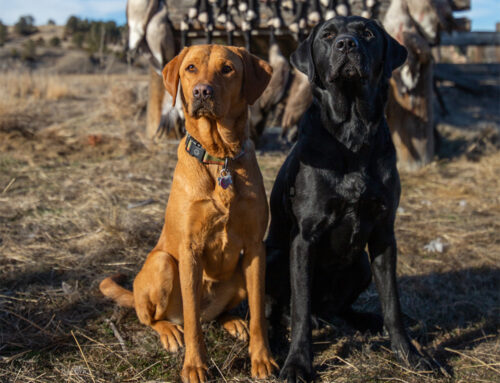
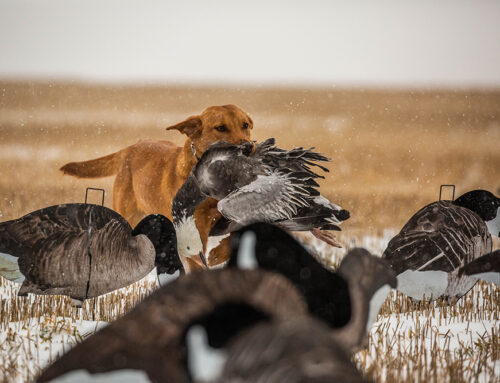
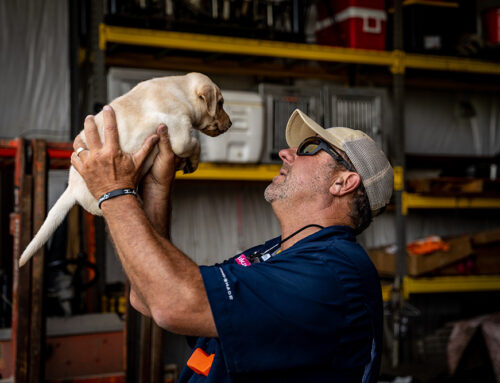
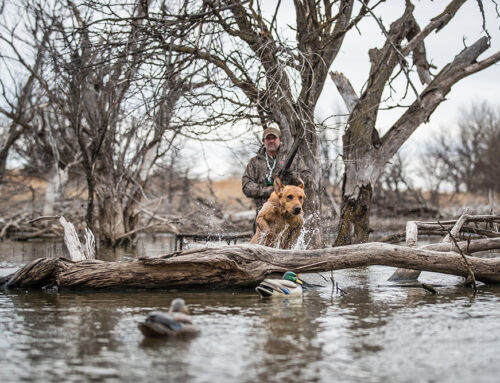
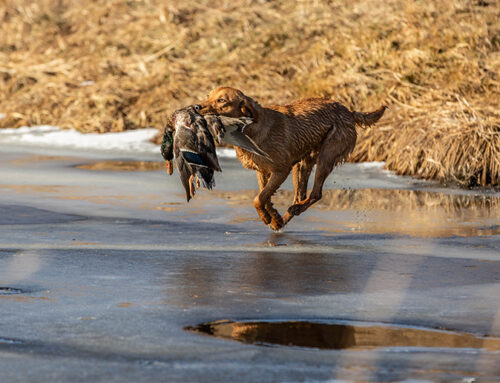
Force fetch is not about “Fetching” it’s about teaching the dog to turn off pressure. A force fetched dog is more comfortable and responds better in all situations. It knows what to expect and knows it is in control of turning off presure…
All retrievers need to be Force Fetched. Having a GREAT desire to get and retrieve a bird has nothing to go with it…
Evan Graham has a great series called Smart Series on Retriever Training. I recommend it highly. Especially his Smart Fetch book and CD.
I agree Troy; force fetch is the foundation for marking, blinds and delivery to hand. And it’s not an impossible task for the amateur.
Blind manners of a dog are very important and the lack of a well mannered dog is a safety issue. Steadiness when ducks are work is also very important.and helps the dog in marking falls.
I am just starting with the training of my 5 year old lab beagle mix, she knows all of her basic household/family dog commands and a verity of tricks, which only took a matter of minutes for her to learn and retain. I know the key to this is reparation and positivity. So my question is should I stick to the scheduled amount of days for that particular step or should I move on to the next step of our training schedule?
P.S. I have trained all of my dogs basic obedience, but this will be my first time training a duck hunting dog, so any helpful tips or any advice will be greatly apprenticed!
Do what is comfortable with you and your dog and don’t worry about set times since your dog has some basic obedience. Also, focus on what type of hunting you will be doing and get most comfortable there before you move on to a wide variety since it is your dog and not a competition dog.
From the retriever’s perspective, hunting concepts can be different that training for hunt tests. A hunting dog with experience can track cripples, dive for a cripple, deal with river currents, patiently wait without whining for hours, recognize a flying cripple among a flock flying away, etc. Experience is the best teacher for these aspects of a hunting retriever.
There are so many different opinions out there when it comes to dog training! Honestly, if you’re new to the game, listen to everybody sort out the BS and figure out what works for you. These retrievers are an amazing conservation resource.
We have a trained duck dog that hangs around our house. What is good to put in the woods for the dog to find? He takes directions well just don’t want him to lose interest?